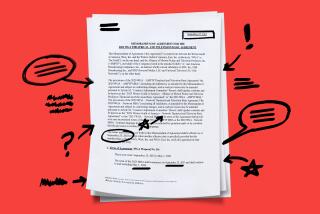Bad Review for This Soap Opera
- Share via
Revelations that the White House reviewed scripts of some network television programs as part of its antidrug efforts are troubling in many ways. Under the arrangement, networks that put certain antidrug messages in programming were rewarded with a reduction in their public service commitment. The White House already was paying the networks hundreds of millions of dollars to carry antidrug ads, and the networks were supposed to match those ads with unpaid public service commercials. Now, the matching broadcast time--an inadequate public service to begin with--is being partly waived.
This development also raises much broader questions about the efficacy of the federal government’s costly, long-running so-called war on drugs and about the churlishness of the networks in meeting any public service obligations as licensees of the public airwaves.
Under the unorthodox arrangement that was first detailed last week by the online news service Salon, the White House Office of National Drug Control Policy over the past few years scrutinized in advance scripts and footage from more than 100 episodes on the major networks. The programs included such hits as “ER,” “The Drew Carey Show” and “Beverly Hills 90210.” If the federal officials approved of the antidrug messages in a show, the networks got credits they could use to reduce the number of public service announcements they had to air to match the antidrug spots paid for by the federal government.
Both network executives and officials from the federal drug control office insist that the networks never ceded control over content of the TV shows. But the cozy practice nonetheless amounts to an unwarranted government advertising subsidy.
This embarrassing case was compounded by the coincidental release last week of a White House study praising television for its treatment of drug, tobacco and alcohol, as compared with treatment in movies and music--in effect, praising the White House’s own secret efforts to reward TV producers.
Is it too much to ask that the government keep its nose out of the story lines of TV dramas and comedies? And is it too much to ask network executives to reread the fine print on their federal licensing agreements and do the right thing?
More to Read
The biggest entertainment stories
Get our big stories about Hollywood, film, television, music, arts, culture and more right in your inbox as soon as they publish.
You may occasionally receive promotional content from the Los Angeles Times.










